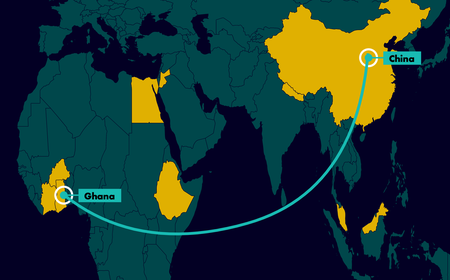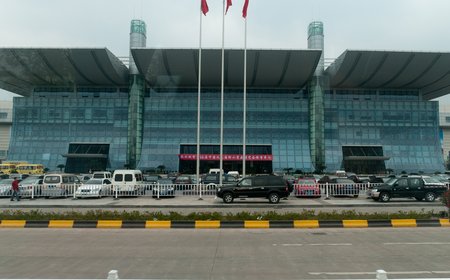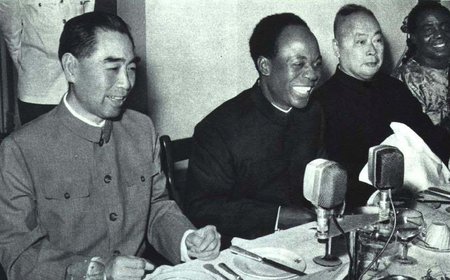In March 2020, COVID-19 hit the global economy. According to the latest forecast of the International Monetary Fund, global GDP fell by 3.5% in 2020. However, for specific individuals, the impact of the pandemic is varied: while for some it is a challenge, for others it is an opportunity.
Yiwu, located in Zhejiang Province, China, is known as an international trade city. Yiwu International Trade City, founded in 1982, now has more than 70,000 shops and covers an area of more than 4.7 million square meters. It is one of China's largest export bases for small commodities. Products from Yiwu have been exported to 219 countries and regions, with an annual export of more than 570,000 standard containers. In 2019, the number of merchants in the Yiwu small commodity market reached 78,900, with about 230,000 people working in the market. The total value of transactions reached 458.31 billion yuan. At the end of 2019, the number of foreign-funded enterprises in Yiwu reached 8,046.
Yiwu is one of the two major destinations for African businessmen entering China (the other is Guangzhou). While there are women engaged in business activities, during our fieldwork we primarily encountered businessmen, thisthe focus of this blog is on African businessmen and their experiences in Yiwu. According to statistics from the Yiwu Public Security Bureau, there are more than 2,500 businessmen from more than 50 African countries and regions based in Yiwu and around 95,000 African businessmen enter Yiwu every year. Missing from this data is a breakdown of countries where the migrants originate from, highlighting the need for further data and research on African migrants in China.
Most of the African businessmen that we encountered in Yiwu are between 20 and 50 years old. Their business activities in Yiwu are mainly related to the purchase of Chinese goods, which are then shipped back to their home country for sale. After sales, most of the income is remitted to China through banks in Dubai to support the development of subsequent commercial activities. The business scale of African businessmen in Yiwu varies greatly. The businessmen who own small businesses enter China for a short time, buy a small amount of goods and take them away. They are sometimes called "backpackers" reflecting the small number of goods they buy. Others are businessmen with registered companies in China, who can stay in China for a relatively long periods of time. They choose and buy their own goods, sending these goods back to their home countries through logistics companies. Finally, there are some big businessmen who run larger companies and often have fixed partners, which allows them to complete merchandise activities without even entering China.
The impact of COVID-19 in Yiwu
It is clear that in the context of the global pandemic of COVID-19, the business cycle of some businessmen has been disrupted. Our research team went to Yiwu to conduct field research, speaking with African businessmen. Through our interviews, we found that China's restrictions on visas for foreign citizens, to control the pandemic, are stricter. This makes it impossible for most African businessmen to enter China. Most African businessmen we interviewed do not have fixed partners. Thus, being present to complete the selection, order and inspection of goods is an important way for them to ensure the quality of goods: absence in country means increased risk. This is coupled with the fact that the number of international flights has decreased significantly while ticket prices have risen rapidly. This makes it difficult to enter Yiwu for small-scale business activities because the profits after the sale of goods may not cover the cost of tickets.
As a result, "backpackers" were greatly impacted in the pandemic. They have no legally registered companies in China, making it difficult to obtain visas, and the huge rise in airline tickets has greatly squeezed their profits. Through our interviews, we found that the impact of the pandemic fell directly on them, promoting the accelerated demise of this group.
The fate of businessmen who own companies in Yiwu depends on whether they can stay in Yiwu. For those who have left, their business in China was either suspended or maintained with the help of friends. For those who stayed in Yiwu, although the start of the pandemic at brought challenges, it also ushered in an unprecedented opportunity. As the pandemic was gradually brought under control, the Yiwu small commodity market reopened. The decline in the number of African businessmen in Yiwu also means less competition. For those few businessmen who still have access to goods, this can mean huge profits given that they can transport the goods back to their home country. In addition, African businessmen staying in Yiwu also assist their friends who are unable to enter China by checking and sendingthe booked goods. Through this process, they not only get a certain percentage of the profit, but also form new business ties.
In addition, we interviewed African businessmen who own large companies, who are able to stay abroad. Long-term and large-scale business activities enable them to have fixed partners, and their business activities have gradually transferred from offline to online. The quality of the goods can also be guaranteed by the commercial trust and demand formed by the long-term cooperation between the two parties. Therefore, COVID-19 did not have a direct negative impact on their business.
According to the statistics of Yiwu Customs, in 2020, the total trade volume between Yiwu and African countries has reached 66.6 billion yuan. Behind the prosperity is the uneven impact of the pandemic and the accelerated division among African businessmen. Among them, the businessmen with large companies were often immune to the impact of the pandemic because of their ability to adapt their activities to a COVID-19 environment. Those businessmen able to stay in China increased profits and opportunities for further development. Those unable to enter China have stagnated this year and were left behind by their peers. The "backpackers", who were already at the bottom, have disappeared from the market.
Accompanied by the division is the decline in the scale of migration. For small businessmen, traveling and studying are common ways to get a visa. Yet these two kinds of visas do not allow them to engage in commercial activities in Yiwu. Under the pressure of the pandemic and the market, informal migration activities have decreased significantly. With the interruption of migration flows, the families of these small businessmen may also face more difficulties. The loss of their income means that their livelihoods have changed as well. While the long term impacts of the pandemic are still unknown, the process of adjusting is bound to be difficult and painful.



